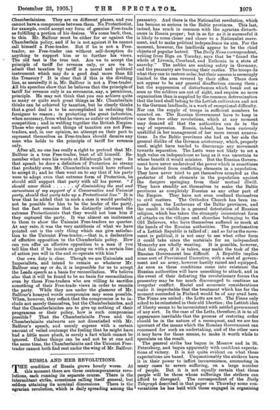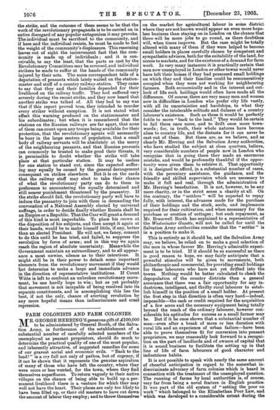peasantry. And there is the Nationalist revolution, which has become
so serious in the Baltic provinces. This last, indeed, has much in common with the agrarian disturb- ances in Russia proper ; but in so far as it is successful it is likely to come closer and closer to a Nationalist move- ment, and to make political independence its aim. For the moment, however, the landlords appear to be the chief objects of popular hatred. The Daily News correspondent, writing from Riga on Tuesday, says that he " found the whole of Livonia, Courland, and Esthonia, in a state of anarchy." The nobles are seeking safety in Germany, and the peasantry are burning their castles. The troops do what they can to restore order, but their success is seemingly limited to the area covered by their rifles. There does not appear to be any general disaffection among them ; but the suppression of disturbances which break out as soon as the soldiers are out of sight, and require no more organisation than is supplied by the common determination that the land shall belong to the Let tish cultivators and not to the German landlords, is a work of exceptional difficulty. Nor can the supply of troops in sufficient numbers be counted on. The Russian Government have to keep in view the two other revolutions, which at any moment may demand all that the authorities can do in the way of repression. Russia, indeed, has been curiously unskilful in her management of her more recent annexa- tions. In the Baltic provinces she had on her side the general dislike of the German aristocracy, which, properly used, might have tended to discourage any movement towards separation. The Letts were not likely to set a high value on independence so long as it was uncertain to whose benefit it would minister. But the Russian Govern- ment have never understood the power which is sometimes to be derived from conflicting elements in a population. They have never tried to get themselves accepted as the protector of both elements in the population against the dangers springing from their mutual illwill. They have steadily set themselves to make the Baltic provinces as completely Russian as any other part of the Empire. They have not even confined themselves to civil matters. The Orthodox Church has been im- posed upon the Lutherans of the Baltic provinces, and the result is visible in a. general detestation of Russian religion, which has taken the strangely inconsistent form of attacks on the villages and churches belonging to the Old Believers, who have themselves suffered so much at the hands of the Russian authorities. The proclamation of a Lettish Republic is talked of ; and so far as the move- ment is political, it is not easy to see what other• form it could take since the materials for an independent Monarchy are wholly wanting. It is possible, however, that this step, if it is taken, may make the task of the Russian Government less difficult. A Republic implies some sort of Provisional Executive, with a seat of govern- ment and an army, however hastily raised and equipped. As soon as these conditions come into existence the Russian authorities will have something to attack, and in the event of their defeating the revolutionary forces the peasantry may be too much discouraged to continue an irregular conflict. Racial and economic considerations make it improbable that the treatment which has for the moment succeeded in Finland would be of any avail here. The Finns are united ; the Letts are not. The Finns only asked to be reinstated in their old liberties ; the Lettish idea of liberty seems to be inconsistent with settled government of any sort. In the case of the Letts, therefore, it is to all appearance inevitable that the process of restoring order should be in the nature of a reconquest, and we are too ignorant of the means which the Russian Government can command for such an undertaking, and of the other uses it may have for those means, to make it worth while to speculate on the result.
The general strike has begun in Moscow and in St. Petersburg, and begun apparently with confident expecta- tions of victory. It is not quite evident on what these expectations are based. Unquestionably the strikers have it in their power to inflict inconvenience, amounting in many cases to severe suffering, on a large number of people. But it is not equally certain that these people will be those whose sufferings the strikers can afford to disregard. The correspondent of the Daily Telegraph described in that paper on Thursday some con- versations he has held with those engaged in organising the strike, and the outcome of them seems to be that the work of the revolutionary propaganda is to be carried on in entire disregard of any popular antagonism it may provoke. The individual must be sacrificed to the community, and if here and the individual resists, he must be made to feel the weight of the community's displeasure. This reasoning leaves out of sight the inconvenient fact that the com- munity is made up of individuals ; and it is con- ceivable, to say the least, that the parts as cast by the Revolutionary Committees may be reversed, and individual strikers be made to suffer at the hands of the community injured by their acts. The same correspondent tells of a deputation of peasants which lately waited on the station- master and staff of a country railway-station. They came to say that they and their families depended for their livelihood on the railway traffic. They had suffered very severely during the recent strike, and they now heard that another strike was talked of. All they had to say was that if this report proved true, they intended to murder every striker without exception. It is not stated what effect this warning produced on the stationmaster and his subordinates ; but when it is remembered that the stations on the Russian railways are far apart, that none of them can count upon any troops being available for their protection, that the revolutionary agents will necessarily be busy in the large centres of population, that a small body of railway servants will be absolutely at the mercy of the neighbouring peasants, and that Russian peasants can commonly be trusted to make good their threats, it is permissible to doubt whether the strike will take place at that particular station. It may be useless for one station to stand out, since the expected suffer- ing may equally be caused by the general derangement consequent on strikes elsewhere. But it is on the cards that the railway staff may elect to take their chance of what the revolutionary party can do to them in preference to encountering the equally determined and still nearer punishment threatened by the peasantry. If the strike should fail, the revolutionary party will have to induce the peasantry to join with them in demanding the convocation of a National Assembly elected by universal suffrage, in order to decide finally whether Russia shall be an Empire or a Republic. That the Czar will grant a demand of this kind is most improbable. To place his crown at the disposition of his subjects, and then accept it again at their hands, would be to make himself little, if any, better than an elected President. He will not, we fancy, consent to do this until he has tried, and failed, to suppress the revolution by force of arms ; and in this way we again reach the region of absolute uncertainty. Meanwhile the Government maintain an extraordinary, and to all appear- ance a most unwise, silence as • to their intentions. It might still be in their power to detach some important elements from the revolutionary movement if they would but determine to make a large and immediate advance in the direction of representative institutions. If Count Witte is left to confront an unbroken revolutionary move- ment, he can hardly hope to win ; but as yet probably that movement is not incapable of being resolved into its separate constituents, and in accomplishing this lies the best, if not the only, chance of averting revolution by any more hopeful means than indiscriminate and cruel repression.
FARM COLONISTS AND FARM COLONIES.







































 Previous page
Previous page